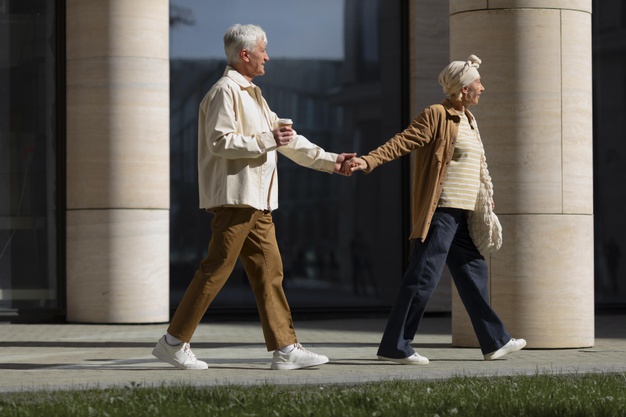Ever Consider Your Walking Speed a Vital Sign or Health Metric?
“As you walk down the fairway of life you must smell the roses, for you only get to play one round” Ben Hogan
There’s a reason cities and senior living communities promote walkability. Walking allows you to continue having a rich life even after you stop driving, it’s a nice way to get outside in fresh air, and it’s good for your health. As you establish your walking pace, check your speed.
Walking speed may be a vital sign – McMaster Optimal Aging Portal, Hamilton, Ontario, Canada, says walking speed is one indicator of overall health and may be another vital sign, similar to blood pressure and heart rate, as a measure of overall health as we age.
As we age, particularly if we don’t get enough exercise, our walking and mobility, or ability to move freely and easily, often becomes more difficult. Slowing down is natural. With intentional practice, we can also pick up the pace.
For reference and learning, McMaster’s online training (https://www.mcmasteroptimalaging.org/e-learning/walking-speed-is-it-a-vital-signhttps://bit.ly/2QeyPpk) provides a way for you to test and improve your walking ability and speed. The big payoff of keeping active is keeping an array of adverse health issues at bay, avoiding falls, and being able to age at home.
It starts with a simple measurement, the DIY 10-Metre Walk Test, that determines your walking speed. Once you get your results, you can take steps to enhance your strength, flexibility, and speed. Through training, stretching, overall fitness, and brain training, you can improve mobility. McMaster shows you how in its learning modules. They include directions on doing the 10-metre test, standing and leg exercises for strength and flexibility, tips for overall health, and how to become a more vigorous walker.
Tips for Rapid Improvement Include:
- Practicing walking and consciously monitoring your progress.
- Increase your speed for short distances.
- Walking forwards and practice changing directions, walking sideways, and then forwards and backward.
- Limiting daily sedentary time to 8 hours or less.
- Getting 7 to 9 hours of sound sleep each night.
Event Calendar | Senectus Serving Seniors
HollersTeam.com | McNair-DallasLaw.com | AssistingHandsHomeCare.com | MunnMorris.com | RubyCareSenior.com | SeniorMovingCompany.com
